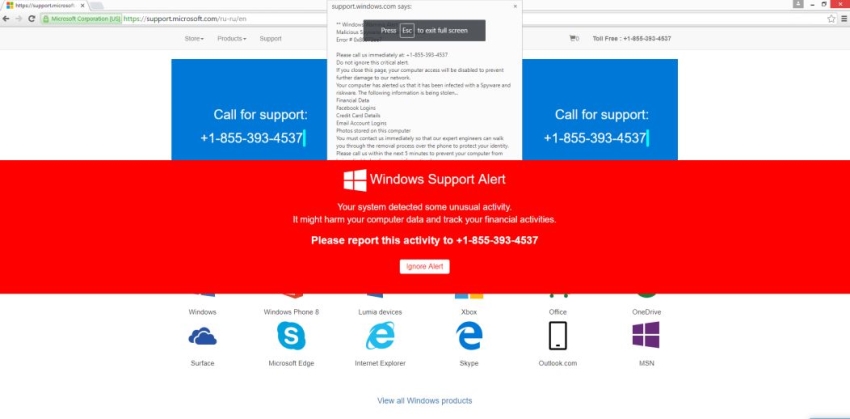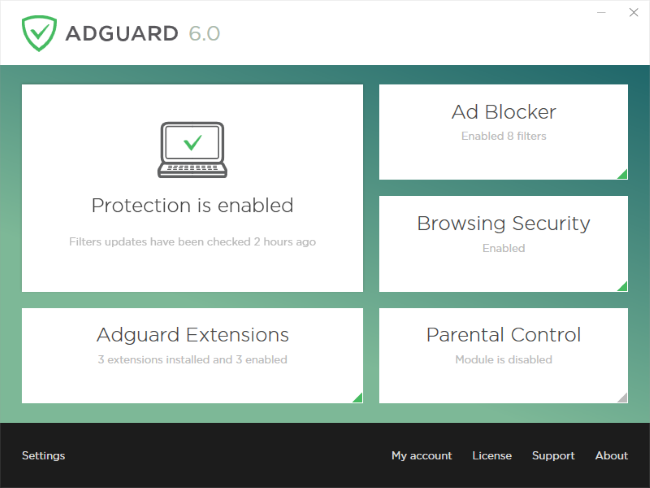
What is “Windows Support Alert”?
“Windows Support Alert” is a fake alert that pretends to be an official warning from Microsoft. The user might face the alert while surfing the Internet; it pops up stating:
Windows Support Alert
Your System Detected Some Unusual Activity.
It might harm your computer data and track your financial activities.
Please report this activity to +1-877-290-1999
If the user closes the window it will show another message:
Virus Alert From Microsoft
This computer is BLOCKED
Do not close this window and restart your computer.
Your computer’s registration key is Blocked.
Why we blocked your computer?
The Window’s registration key is illegal.
This Windows is using pirated software.
This Window is sending virus over the internet.
This Windows is hacked or used from undefined location.
We block this computer for your security.
Contact Microsoft helpline to reactivate your computer.
Windows Support Alert aims to trick users into believing that their system is under a threat. In no case should contact them because you may become a victim of fraud and lose your money. Sure you can just ignore these pop-ups knowing it is a trap, however, to completely get rid of them, you need to remove a PUP (potentially unwanted program) by “Windows Support Alert” that causes these ones. PUPs often sneak into the system unnoticed along with freeware and are automatically installed as an optional offer. Here you will find both automatic and manual methods to remove “Windows Support Alert” pop-up. Just follow the instructions, described below.
How to remove “Windows Support Alert” pop-up from your computer?
It scans your computer and detects various threats like “Windows Support Alert” pop-up, then removes it with all of the related malicious files, folders and registry keys. After deep scanning of your system, it will easily find and delete “Windows Support Alert” pop-up. Use this removal tool to get rid of “Windows Support Alert” pop-up for FREE.

How to remove “Windows Support Alert” pop-up manually
Note: Removing “Windows Support Alert” pop-up goes in Safe mode with networking.
How to enable Safe mode:
For Windows XP, Vista, 7
- Turn off your PC;
- Turn it on and immediately press F8 button;
- You’ll see Advanced Boot Options menu;
- Select Safe Mode with arrow buttons;
- In Safe Mode navigate to Control Panel, then choose Uninstall a program and remove “‘The proxy server is not responding’ error”.
For Windows 8/8.1 and 10
- Press the Win+R buttons, type msconfig in box and press Enter;
- Choose Boot tab, and click on Safe Boot check box;
- Select the type of Safe Mode: Minimal or Network;
- Press OK and reboot your PC;
- In Safe Mode navigate to Control Panel, then choose Uninstall a program and remove “‘The proxy server is not responding’ error”.
Step 1: Remove “Windows Support Alert” pop-up from Control Panel
In order to get rid of “Windows Support Alert” pop-up, first thing you need to do is to uninstall malicious program from your computer. When removing “Windows Support Alert” pop-up, try to find suspicious recently installed programs and delete them too, as it’s pretty common that any malware comes with some other unwanted programs.
Windows XP:
- Select Start.
- Control Panel.
- Then choose Add or Remove Programs.
- Search for program related to “Windows Support Alert” pop-up.
- Click Uninstall.
Windows 7/Windows Vista:
- Select Start.
- Then Control Panel.
- Choose Uninstall a Program.
- Find program related to “Windows Support Alert” pop-up and choose Uninstall.
Windows 8/Windows 8.1:
- Open the Menu.
- Select Search.
- After that choose Apps.
- Next Control Panel.
- Then as in Windows 7, click Uninstall a Program under Programs.
- Find program related to “Windows Support Alert” pop-up, select it and choose Uninstall.
Windows 10:
- Click on the Start button (or press the Windows key) to open the Start menu, then select Settings at the top.
- Choose App & features on the left menu.
- On the right side, find program related to “Windows Support Alert” pop-up and select it, then click on the Uninstall button.
- Click on Uninstall to confirm.
Note: If you can’t find required program, sort programs by date in Control panel and search for suspicious recently installed programs.
Step 2: Remove “Windows Support Alert” pop-up from browsers
Once you’ve uninstalled the application, remove “Windows Support Alert” pop-up from your web browser. You need to search for recently-installed suspicious add-ons and extensions.
Google Chrome:
- Open Google Chrome
- Push Alt + F.
- Choose Tools.
- Select Extensions.
- Search for program related to “Windows Support Alert” pop-up.
- Select the trash can icon to remove it.
Microsoft Edge
- Open Microsoft Edge
- Select the three dots icon (top right corner).
- Choose Extensions.
- Search for any recently-installed and unknown/suspicious extensions.
- Choose them with right click of your mouse and select Uninstall feature.
Mozilla Firefox:
- Open Firefox.
- Push Shift + Ctrl + A.
- Select program related to “Windows Support Alert” pop-up.
- Choose Disable or Remove option.
Internet Explorer:
- Open IE.
- Push Alt + T.
- Choose Manage Add-ons option.
- Click Toolbars and Extensions.
- Next select program related to Disable “Windows Support Alert” pop-up.
- Choose More information link in the left-bottom corner.
- Click Remove button.
- If this button is grayed out – perform alternative steps.
Step 3: Removing malicious link from your browser shortcuts
Sometimes even removing of malicious program from your computer and web browser can’t help. If you are still facing unknown webpage when you open your web browser, then you might have your browser shortcut changed. It’s pretty common trick that performs most of browser hijackers. They change your browser shortcut so that every time you open it you’ll see not your homepage, but some advertisement webpage. But this issue is quite simple to fix. The instruction stated below matches most of the browsers.
- Right-click on your browser shortcut, choose Properties.
- If you see a link to some website after .exe in the Target field, read on.
- Usually you are not able to delete a link from Target field, that’s why you need to click on the Open File Location button in this window.
- Once you’ve opened file location, select chrome.exe/firefox.exe/iexplore.exe.
- Right-click on this file and choose Sent to option, then Desktop (create shortcut).
- New shortcut will have no additional redirection links.
- Delete old infected shortcut. If you got one in your taskbar, delete it from there too.
- Now you have new and clear shortcut without redirection to unknown websites.
Step 4: Resetting your browser search and homepage settings
To be sure that there is nothing left behind, we recommend you to reset your browser. It will restore your browser settings to default.
Reset browser settings in Google Chrome:
- Click the Chrome menu (3 bar button) in the top right corner.
- Choose Settings.
- Click Show advanced settings.
- Go to Reset browser settings section.
- Click Reset browser settings.
- In the dialog that appears, click Reset.
Reset browser settings in Microsoft Edge:
- Select the three dots icon (top right corner).
- Click on Settings feature.
- Select Choose what to clear.
- Manage which data you need to clear and select Clear.
- Open Task Manager (right click on the Task Bar).
- In the Task Manager menu, search for Microsoft Edge process, then right click on it and choose Go to details.
- Find all Microsoft Edge entries, then right click on each of them and select End Task.
Reset browser settings in Mozilla Firefox:
- Open Mozilla Firefox.
- Go to Help.
- Go to Troubleshooting information.
- Click Reset Firefox… button.
Reset browser settings in Internet Explorer:
- Open Internet Explorer.
- Click on the cogwheel in the right upper corner.
- Click Internet options.
- Got to Advanced tab.
- Click Reset button.
- Put a tick near Delete personal settings checkbox.
- Click Reset button.
How to block malicious pop-ups in browsers

Adguard is a perfect application that will get rid your system of annoying ads, online tracking and will provide reliable protection from malware. The main advantage of Adguard is that you can easily block any types of ads whether legitimate they or not within your browser. Use it for FREE.
Adguard provides 14 days for trial use, to continue using the program, you will need to purchase the full version: $19.95 for a yearly subscription/ $49.95 for lifetime version. By clicking the button, you agree to EULA and Privacy Policy. Downloading will start automatically.